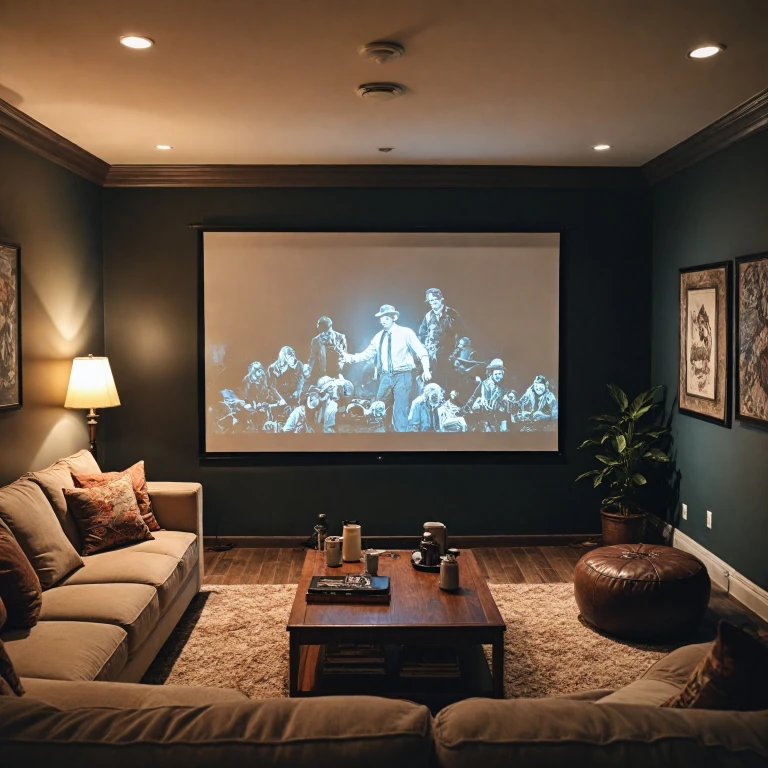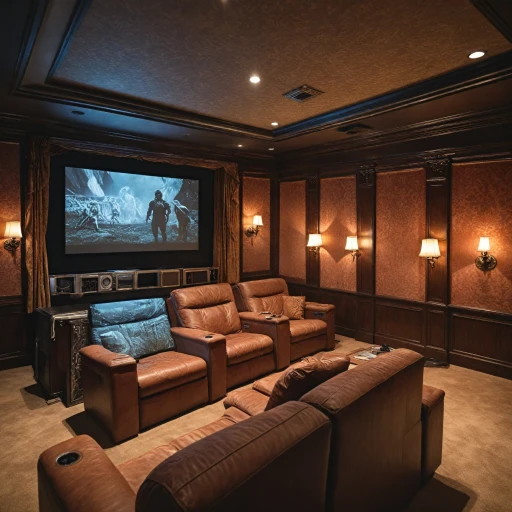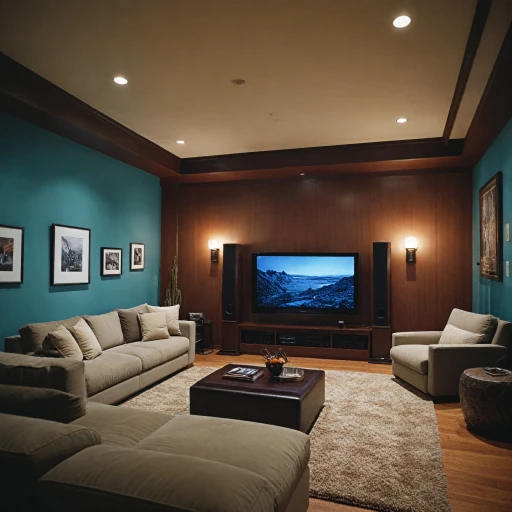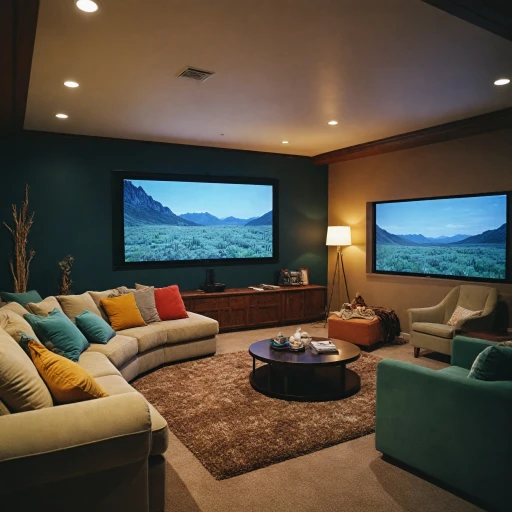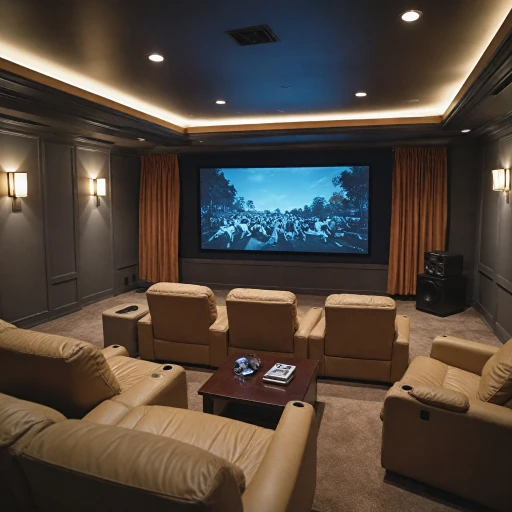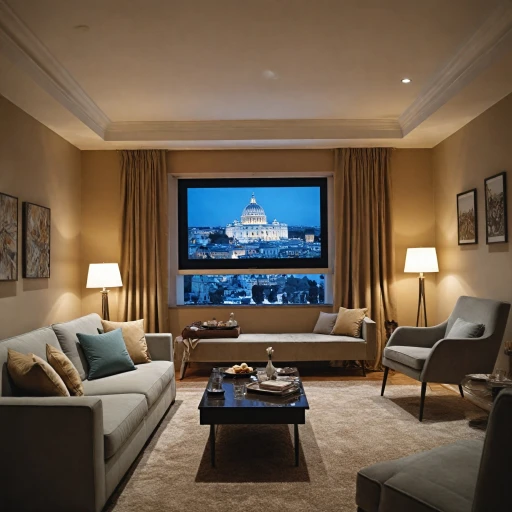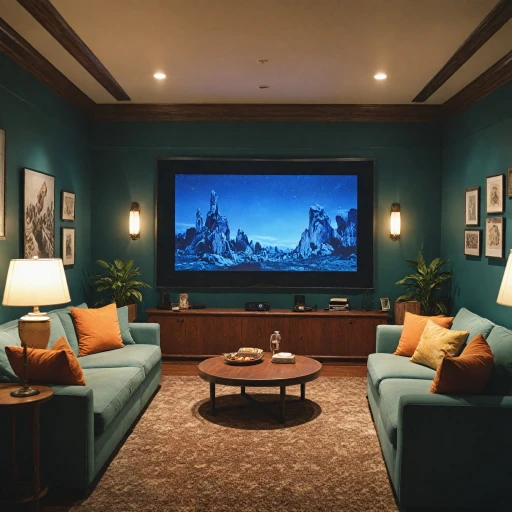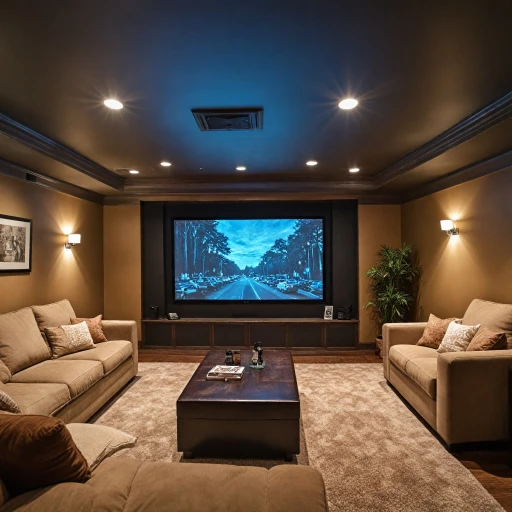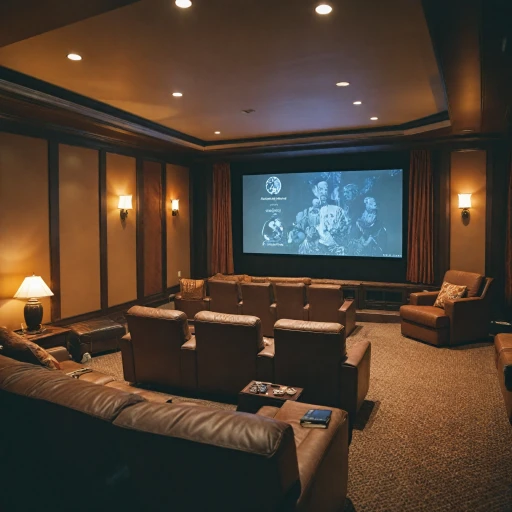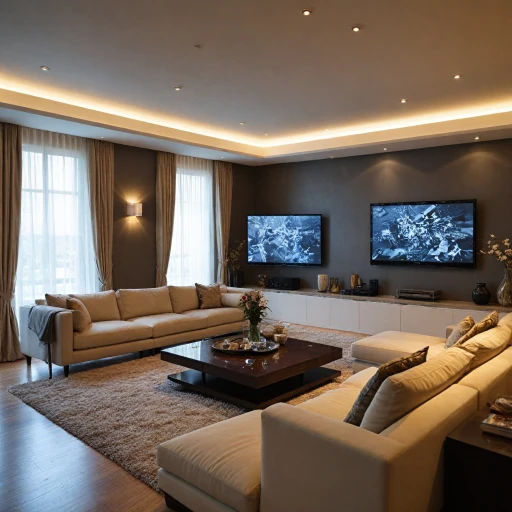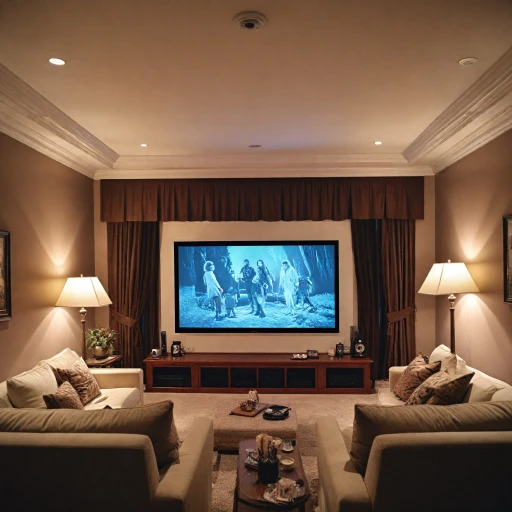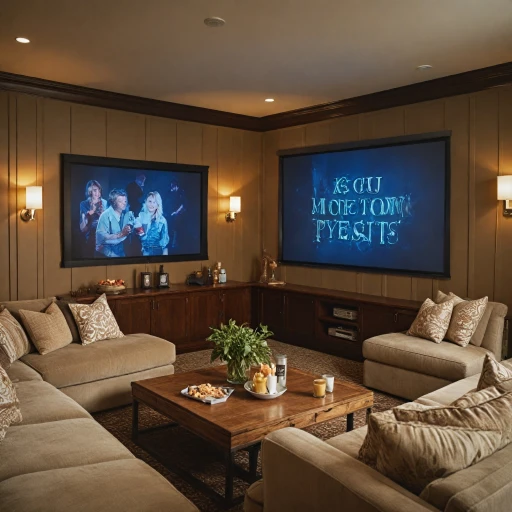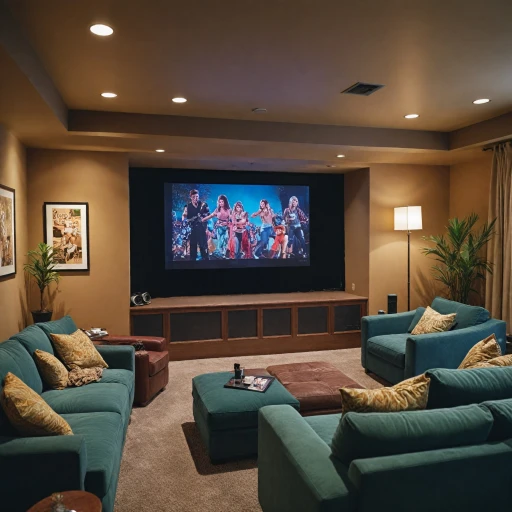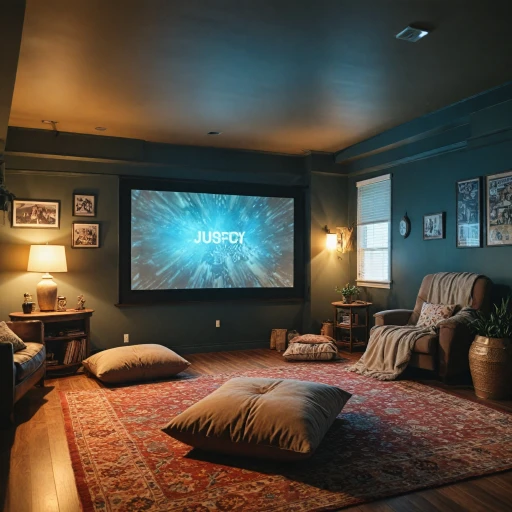
Understanding the Basics of Projector Screens
Introduction to How Projection Screens Work
Understanding the basics of projector screens lays the groundwork for an enhanced home theater experience. Projection screens are not just simple surfaces to display videos. They play a crucial role in image quality, clarity, and overall viewing pleasure. Whether you're planning a day for an outdoor movie or setting up an indoor cinema event, the importance of choosing the right screen cannot be overstated. Projection screens vary significantly in terms of size, material, and design. From fast fold options to large LED screens, the choices depend on your specific needs and environment. The material of the screen influences factors like contrast and brightness, crucial for creating a vivid and immersive movie experience. When you rent projection screens, it's essential to understand their specifications, such as the type of projector they're compatible with. This includes being mindful of the lumen capacity of your projector. A high lumen projector is necessary for bright and vibrant images, especially in larger venues or during daylight events. For those who are interested in enhancing their home theater setup, it's important to consider the synergy between projection screens and other equipment like audio setups and pipe drape systems. This ensures the projection is adequately supported for your specific event type. If you are setting up a home theater or planning events in areas like San Francisco, where portability and ease of setup are priorities, rental options provide a flexible solution. With screen rentals, you can select from different packages tailored to daily events or even longer-term needs, offering both convenience and cost-effectiveness compared to purchasing. While navigating these options, consider exploring a floor screen as an alternative to traditional setups. You can delve into more details about optimizing your home theater by checking out this insightful guide on floor screens. This resource offers valuable information to ensure your equipment matches your home's audio-visual requirements perfectly.Benefits of Renting a Projector Screen
Advantages of Opting for a Projector Screen Rental
Renting a projector screen for your home theater can help you enjoy a high-quality viewing experience without committing to a permanent setup. Here are several reasons why opting for a rental might be beneficial:- Cost-Effective Solution: Renting offers a cost-effective way to experience a large projection screen without the initial investment required for purchase. For occasional use, especially during special events or gatherings, rental fees can be more economical.
- Flexibility for Different Events: Projector screen rentals offer the flexibility to select equipment based on the specific needs of the event. Whether for an outdoor movie night or a special event, you can choose screen rentals that match the audio and visual requirements of the day.
- Access to Latest Technology: By renting, you gain access to the latest equipment, such as high-definition and LED projectors, ensuring high-quality video and audio. This is particularly useful if you want a lumen projector for a bright and clear display.
- Convenience and Ease: With rental services, you often get packages that include not just the screen but also related accessories like pipe drape setups or fast-fold screens. Professional setup assistance might also be available, which minimizes the hassle of installation.
- Tailored Renting Packages: You can select from different screen packages based on your specific needs. Each rental company may offer a variety of options to cater to both small and large home theater spaces.
Factors to Consider When Renting
Key Considerations for Renting a Projector Screen
When opting to rent a projector screen for your home theater, several factors come into play, influencing your overall experience. Carefully weighing these considerations ensures you choose the right projection screen for a seamless movie or video experience.- Projection Screen Type: Determine the type of screen needed based on your viewing content, whether it’s movies, live sports, or video games. Options include fixed, retractable, or portable screens, each offering unique benefits for different event types.
- Screen Size and Aspect Ratio: Choose a screen size that complements your space constraints and viewing distance. Likewise, select an aspect ratio that matches your projector’s output, typically 16:9 for standard home theater setups.
- Quality and Features: Consider screen rentals that provide high definition and are equipped with additional features such as fast fold or pipe drape systems. These enhancements can significantly improve image quality and ease of setup.
- Lumen Rating Compatibility: Ensure the screen is compatible with your projector's lumen output. For large spaces or outdoor movie setups, a high-lumen projector and matching projection screen are crucial to achieving bright and clear images.
- Rental Packages: Look into different available screen packages for projector rentals. Some packages may also include audio systems, useful for an immersive experience without needing separate audio equipment.
- Cost and Rental Duration: Compare the rental costs and duration against your usage needs. Whether it’s a single day event or extended screening, striking a balance between daily rates and projector day rentals impacts your budget.
- Service Location: Check if the service offers delivery and setup within your zip code, especially in regions like San Francisco. Ensuring logistical convenience saves time and ensures professional deployment.
Comparing Rental Costs vs. Buying
Analyzing Rental Costs versus Purchase Prices
When setting up a home theater, deciding whether to buy or rent a projector screen can significantly impact your budget. Understanding the cost dynamics between projector rental and purchasing can guide you toward a financially sound decision.
- Initial Investment: The upfront cost of buying a high-quality projection screen can be substantial, often running into hundreds or even thousands of dollars depending on size, quality, and brand. On the other hand, renting allows for access to large and advanced projectors and screens without the hefty initial expense.
- Flexible Usage: Consider how often you'll need the screen. If your need is temporary, like for an occasional outdoor movie night or a singular event, renting could be more economical. Frequent users may find the cumulative rental price nearing or exceeding the cost of owning a screen.
- Maintenance and Upgrades: Owning means you're responsible for maintenance and storage, while rental companies often include maintenance and setup in the rental package. This can save you from unforeseen costs and hassles associated with equipment care.
- Technology and Features: Renting allows you to try out the latest models and technology such as high lumen projectors or LED projectors, offering diverse features for different events without being tied down to a single purchase.
- Renter's Advantage: Screen rentals often come with additional options like fast-fold screens, pipe drape setup, or audio equipment, making it suitable for grander events or ensuring convenience for short-term usage.
Overall, assessing your specific needs, event frequency, and budget constraints will facilitate the decision between projector screen rentals and purchases. Remember, if you decide to rent, get a detailed quote to understand all costs involved, including delivery and setup within your zip code range, like San Francisco, where events may require specific logistics.
Where to Rent a Projector Screen
Finding the Right Rental Service
When it comes to renting a projector screen for your home theater, location and availability are key factors. Start by searching for rental services in your area using your zip code. This will help you find local providers who can offer quick delivery and setup. If you're in a major city like San Francisco, you'll likely have a wide range of options to choose from.
Exploring Rental Packages
Many rental companies offer various screen packages that include not just the projection screen, but also additional equipment like projectors, audio systems, and even pipe drape setups for a more professional look. Look for packages that suit your needs, whether you're planning a small movie night or a large outdoor movie event. Consider the lumen rating of the projector included in the package to ensure it meets your viewing requirements.
Getting a Quote and Checking Availability
Once you've identified potential rental services, reach out to them for a quote. Be sure to provide details about your event, such as the date, location, and any specific requirements you might have. This will help the rental company give you an accurate estimate and confirm availability. Some companies offer fast fold screens or high definition options, so inquire about these if they are important for your setup.
Evaluating Customer Reviews
Before finalizing your rental, take the time to read customer reviews. This can provide insights into the reliability and quality of the service. Look for feedback on the condition of the equipment, the professionalism of the setup team, and the overall rental experience. This step can help you avoid any potential issues on the day of your event.
Setting Up Your Rented Projector Screen
Steps to Assemble and Utilize Your Rented Projector Screen
Once you've decided on the perfect projector screen for your home theater event, it's essential to set it up properly to ensure a smooth and memorable viewing experience. Here’s a step-by-step guide on how to do just that:
Unpacking and Inspecting the Screen
- When your screen rental arrives, carefully unpack all the components, ensuring that nothing is missing or damaged. Look for items like the stand, the screen itself, and any additional equipment that may come included, such as fast fold or pipe drape setups.
- Consult the rental instructions provided, as there may be details specific to that screen model. This step is particularly crucial if combining the screen with high-definition projectors or lumen projectors for clear image projection.
Setting Up the Screen
- Choose a suitable location for the screen, ensuring it's not under direct sunlight if setting up outdoor movie events. An area with controlled lighting is optimal for the best projection results.
- Follow the assembly instructions carefully. If your screen involves a fast fold mechanism, ensure the locks are secure to prevent accidental collapse during movie night.
- Use a level to make sure the screen is perfectly straight. This will prevent any distortion in the video projection and optimize viewer comfort.
Connecting to Your Equipment
- Once the screen is in place, set up your audio and video equipment. Ensure your projector is compatible with the screen and is adequately aligned for the best viewing angles.
- Check that all cables are securely connected. If using projectors with high lumen output, adjustments may be needed for optimal brightness and clarity.
Testing and Adjustments
- Turn on the projection equipment and test the video quality. Adjust the projector’s focus and keystone settings as needed, especially if using LED models.
- Test the audio setup as well, ensuring the sound synchronizes with the large screen visuals for an immersive movie experience.
Final Touches Before the Event
- Perform a trial run of the event day media to check all equipment functions seamlessly. Address any issues well ahead of time.
- Ensure you have a backup plan for minor glitches, like extra cables or remote batteries. Having these on hand can save day-of stress during major events.
With these steps, your rented projector screen should be all set to deliver an impressive movie or event experience. Be mindful to return all rental equipment in its original state and on time to avoid any additional charges.

